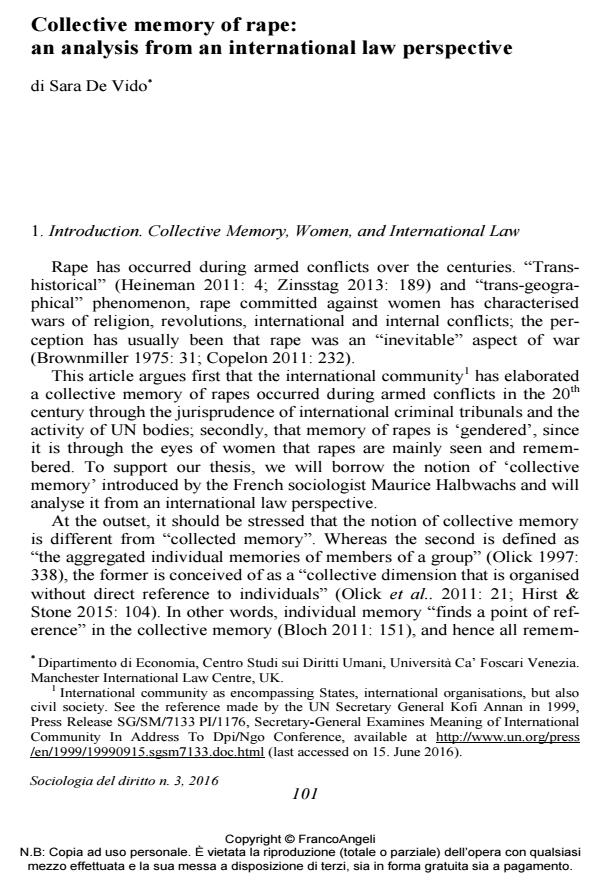Collective memory of rape: an analysis from an international law perspective
Titolo Rivista SOCIOLOGIA DEL DIRITTO
Autori/Curatori
Anno di pubblicazione 2017 Fascicolo 2016/3
Lingua Inglese Numero pagine 32 P. 101-132 Dimensione file 350 KB
DOI 10.3280/SD2016-003006
Il DOI è il codice a barre della proprietà intellettuale: per saperne di più
clicca qui
Qui sotto puoi vedere in anteprima la prima pagina di questo articolo.
Se questo articolo ti interessa, lo puoi acquistare (e scaricare in formato pdf) seguendo le facili indicazioni per acquistare il download credit. Acquista Download Credits per scaricare questo Articolo in formato PDF

FrancoAngeli è membro della Publishers International Linking Association, Inc (PILA), associazione indipendente e non profit per facilitare (attraverso i servizi tecnologici implementati da CrossRef.org) l’accesso degli studiosi ai contenuti digitali nelle pubblicazioni professionali e scientifiche.
This article argues first that the international community has elaborated a collective memory of rapes occurred during armed conflicts in the 20th century through the jurisprudence of international criminal tribunals and the activity of UN bodies; secondly, that memory of rapes is "gendered". To support this thesis, the article borrows the notion of "collective memory" introduced by the French sociologist Maurice Halbwachs and analyses it from an international law perspective. The article starts with a short legal history of wartime rape, before analysing the main judgments rendered by the following international criminal tribunals: the Nuremberg and Tokyo tribunals, the International Criminal Court for the Former Yugoslavia, the International Criminal Tribunal for Rwanda, the Special Court for Sierra Leone, and the International Criminal Court. A paragraph is devoted to the activity of the UN Special Representatives on Sexual Violence in Conflict and of the International Independent Commission of Inquiry for Syria. This contribution then uses the notion of collective memory to comment on the role of international bodies in the preservation of the memory of rapes occurred during armed conflicts.
Il contributo avanza in primo luogo la tesi per cui la comunità internazionale abbia elaborato una "memoria collettiva" degli stupri occorsi duranti i conflitti armati del ventesimo secolo attraverso la giurisprudenza dei tribunali penali internazionali e l’attività degli organismi delle Nazioni Unite; in secondo luogo, esso argomenta che tale memoria sia una memoria "di genere". Per sostenere la sua tesi, l’articolo rilegge in chiave gius-internazionalista la nozione di "memoria collettiva" del sociologo francese Maurice Halbwachs. L’articolo inizia con una breve ricostruzione storico-giuridica per poi proseguire con l’analisi di casi rilevanti esaminati dai seguenti tribunali penali internazionali: Tribunale di Norimberga e Tokyo, Tribunale penale per l’ex Jugoslavia, Tribunale penale per il Rwanda, Corte speciale per la Sierra Leone, Corte penale internazionale. L’indagine è arricchita dai rapporti presentati dalla UN Special Representatives on Sexual Violence in Conflict e dalla Commissione internazionale indipendente di inchiesta sulla Siria. Il contributo utilizza dunque la nozione di memoria collettiva per riflettere sul ruolo degli organismi internazionali nella preservazione della memoria degli stupri compiuti durante i conflitti armati.
Parole chiave:Stupro - Donne - Memoria collettiva - Tribunali penali internazionali
, Collective memory of rape: an analysis from an international law perspective in "SOCIOLOGIA DEL DIRITTO " 3/2016, pp 101-132, DOI: 10.3280/SD2016-003006